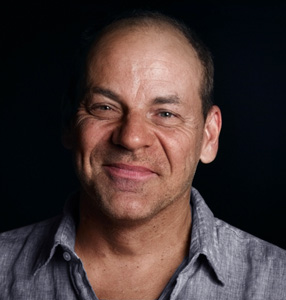Ten years ago, we began to sense that women on the spectrum had largely gone unnoticed and, therefore, undiagnosed to degrees that might actually be beyond our imagination. It was like waking up to find out that the nightmare was real. Thanks to the cultural realities of gender expectation, something was wrong with a boy that didn’t make eye contact. But a girl was shy. Something was wrong with a boy that didn’t like team sports. But a girl was feminine. A stereotypically submissive adult male with low self-esteem was scrutinized for why they had not partnered. But, a stereotypically submissive adult female with low self-esteem usually found their way into a relationship. These very often constituted what we refer to as “abusive relationships.” If the woman could be extracted from it, she was pitied, maybe given support. But was she looked at for an autism diagnosis? No way. These were all very insipid realities, but they were ones that gave boys a better chance of getting looked at for the diagnosis that could really help their lives.
Supporting these ideas were often ethically challenged but ambitious clinicians. Simon Baron-Cohen gained fame for his hyper-focus on the male brain. And recently, DSM-5 Committee member Cathy Lord’s diagnostic tool, the $2,000 ADOS test, was exposed for having screened out girls. Needless to say, if we were doing this poorly with women, it’s not a stretch to assume that our diagnostic capabilities with non-binary and trans people stunk even more.
It’s a subject for another article. But while we’re still behind, we made up for lost time after 2014 or so…somewhat fast. The explosive number of new diagnoses over the last ten years has to be the result of those awakening women and non-binary folk. There’s no data on it yet, but my Connections Program at NYU reflects an over 70% participation rate for female and non-binary-identifying students. Autistic-targeted products, marketing, and articles are now aiming at cis boys infinitely less.
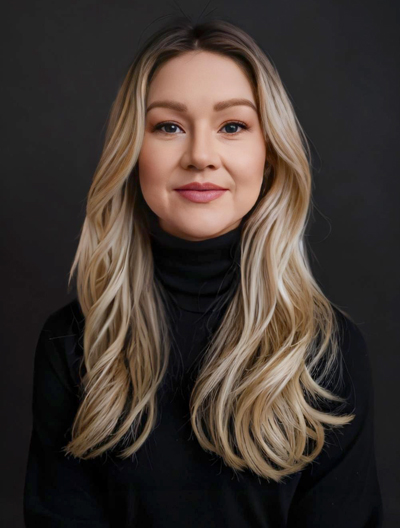
Carol Jean Whittington
Normally, my time is tight. But in early 2022, my sex book was out, and I had an obligation to my publisher to say yes to everything. So when Mona Kay of Neurodiverse Love introduced me to Carole Jean Whittington, I didn’t research audience numbers or preview prior episodes before consenting to do Carole Jean’s “Mind Your Autistic Brain” YouTube show.
And then I met her.
Cut to the chase: When you meet Carole Jean, you’re assaulted with positive vibes. And most of the time that garners “Yawn and sigh” reactions from us cynics. But the volume…She was non-stop! Relentless. She was…True. I thought of the soprano, Kirsten Flagstad, whose voice was so booming that if you were in a small room with her as she sang, you left with bruised ribs.
And that accent…Big. Brassy. Carole Jean is from the South and doesn’t hide it! Inspired, I saw her as a regional beacon. Here was really our first autistic from an area of the US that had relatively little willingness or ability to expand their autism knowledge. She is devoted to SEC (South Eastern Conference) college football. She cooks like a Southerner. In my shamelessly paternalistic desire to mold her career, I wanted her to inspire a region that, as yet, had no real, local heroes.
“Nope,” she told me. “I’m too mainstream.”
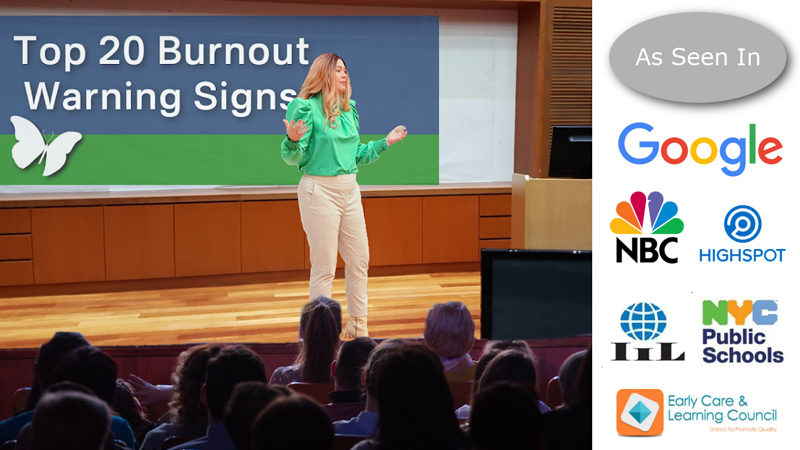
Carol Jean Whittington Presenting on Stage
I checked out her show. “Mind Your Autistic Brain” didn’t have the numbers yet. But she had branding—graphics galore, outfits, attention to hair, and background. Those on her mailing lists got pounded, often daily, with news of her endeavors and the work she was producing on a myriad of fronts. She was destroying my smug, superiority-cynicism of “influencers.” We talked sex on episode 87 of that show, and two friends of mine emailed to say, “Get a room, you two.” (Luckily, neither Carole Jean’s Josh nor my Kathryn were offended).
Fast-forward three years later to the present: According to Carole Jean, her second podcast, Beyond Autistic Burnout, is now heard in 111 countries and just wrapped up its 188th episode. Her first book, “Unleashing Sustainable Energy: A Strategic Approach to Transforming Spicy Burnout for ADHD/Autistic Professionals,” is selling well, and a second book, “Finding Her Autistic Self: A Guide to Self-Discovery,” is on its way. Her website will barrage you with an indefatigable array of products: There’s a course you can sign up for called The Unveiling Method, a membership you can purchase called the Rapid Recharge Lab, or another called the Get Out of Burnout Accelerator for Autistic Women. Or you could sign up for Cycle Harmony…I once confessed my inability to keep up. I think she laughed.
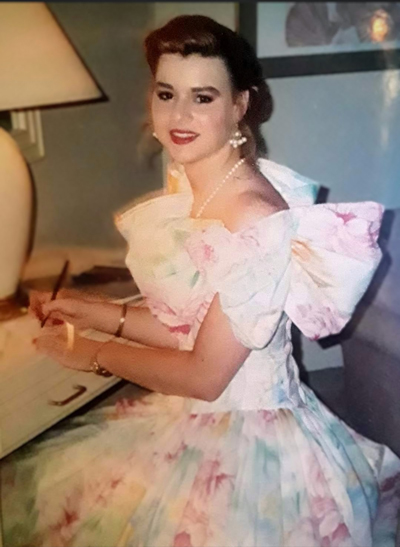
Carol Jean Whittington at age 17
Born in the 70s in rural Alabama, Carole Jean’s mom was a preschool director and former National Merit Scholar. Her dad owned his own real estate firm for over 35 years. Both were brilliant.
The Southern accent was a topic in their house. Dad had no accent, and Mom’s was refined. Carole Jean’s IQ came in at 138, but there was still pressure to get rid of the southern drawl. She was told, “It makes you sound very unintelligent.”
The expectations were that she was to “...marry well. You don’t work anymore. You volunteer.” But she described her emerging self to me as “a hot mess in a cute designer handbag.” There were a few colleges, a few jobs, a few marriages…She was diagnosed with ADHD in her mid-20s, but the autism diagnosis didn’t happen until she was 39. During all those years, there were co-occurring health conditions and decades of chronic stress.
Like many, the job losses were not due to ability but rather burnout. She worked as a paralegal, a divorce commissioner (yup), an insurance adjustor, a real estate appraiser…She has unwillingly cast herself as the burnout queen, and rightly so from so much negativity that she experienced, but that does not show when you meet her. She knows what “Mask and burn out, or suffer!” feels and looks like.
While she’d volunteered to do disaster relief since she was 12, a major turning point in her capacity for compassion came when she was using those real estate and adjustor skills in the New Orleans area right after Katrina.
“House after house. Story after story…”
When the autism diagnosis came, like all of us, she realized so much about her past.
“All those years…I thought I was stupid. I thought I was weak.”
***
She’s been a friend since we met. I say the phrase “How are you?” kind of like an obligatory, almost “throw-away” line, though do I care deeply about those friends I use it on (aren’t most of us like that?). But not Carole Jean. When she reaches out after a period of not talking (and she’s usually the one to do so), she means it. It’s noticeably different. And it hasn’t changed three years later when her speaking gigs are now at places like Yale.
***
The Southeastern United States and Carole Jean have a complicated relationship. She and Josh are building a dream house together in Alabama. But the general attitudes about autism?
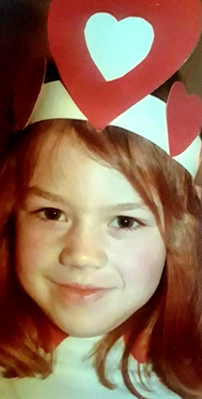
Carol Jean Whittington, Queen of Hearts
“On a Cultural and social level, (autism) is still seen as the cousin you had in the back room, the skeleton in the closet. Or ‘Oh, that’s just cousin Jojo. She’s just a little different.’”
I ask: “You think that’s still prevalent?”
“I think that’s still very prevalent. And if you’re a woman, if you’re a girl with autism? Then you’re definitely not getting help. You’re not even getting noticed. You’re just defective. You’re just seen as ‘We’ll make sure she’s taken care of. We’ll make sure she’s got clothes, she’ll have food, she’s always going to be taken care of. But we’re not going to give her the tools to take care of herself.’”
In the retelling, she gets pissed…
“If you’re pretty. If you’re smart and pretty and you got a mouth and you use it. And you also have a heart and you have compassion, never let anybody tell you you’re wrong.”
She cools down. I ask:
“Then why are you building this house here?”
She looks off, shrugs her shoulders.
“It’s where I’m from.”
I got her 🙂
Michael John Carley is the Facilitator of the “Connections” program at New York University for their worldwide autistic students, and he also has a private, Peer Mentoring practice. In the past, he was the Founder of GRASP, a school consultant, and the author of “Asperger’s From the Inside-Out” (Penguin/Perigee 2008), “Unemployed on the Autism Spectrum,” (Jessica Kingsley Publishers 2016), “The Book of Happy, Positive, and Confident Sex for Adults on the Autism Spectrum…and Beyond!,” (Neurodiversity Press 2021, where he recently became the Editor-in-Chief), and dozens of published articles. His many other current posts include being the Neurodiversity and Leadership Advisor for the League School for Autism, and he is Core Faculty for both Northeastern University’s School of Engineering, and Stony Brook University’s LEND program. For more information on Michael John or to subscribe to his free newsletter, you can go to www.michaeljohncarley.com.



